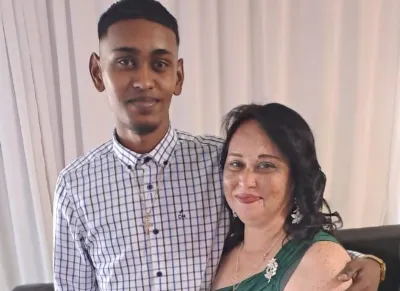Living in silence: the journey of a deaf mom and her son
"He became my ears and my voice."

Kogie Govender and her son Josha
Image: Yoshini Perumal
“I NEVER heard the sounds of my son’s first cry, his first words or his first speech at school. He can never hear me saying I love him, or that I am proud of him. But I taught him sign language from the time he was a toddler, and he became my ears and my voice…”
This has been a painful reality for Kogie Govender, 45, who was born deaf.
She is married to Thenagran Govender, for 25 years and their son, Joshua, is 21.
She said ever since she could remember, her disability was a challenge, and 45 years later, nothing had changed.
“I wake up in silence. I have never heard the voices of my parents, but I felt their love and that got me through. Growing up, I faced stigma due to being deaf. But I realised that to overcome stigma, one had to try to educate people. I do everything for myself. The only thing I cannot do is hold a voice conversation with someone. Because of my inability to hear, I cannot speak.
“Coping as a human without ears that work has not been very challenging. But coping in a world without inclusion for deaf people and communities where there is a stigma, has been intolerable,” Govender added.
She said the biggest challenge she faced was when she needed medical care for her son.
“The medical sector, which is an essential service, lacks inclusion for deaf people. If I have to go to the doctor, I need to take someone along with me. I cannot hear when the receptionist calls my name and miss my turn. Others who could hear did not notify me it was my turn. I would then be last in the queue and spend hours waiting for treatment. I was shocked that people would treat me that way.
“I am able to write down information to communicate with doctors, but sometimes it is difficult to understand the doctor. When my son was born, I had to take a relative with me for every doctor's appointment and check-up as I was afraid that miscommunication could lead to me not taking care of my son properly. As he grew, I taught him sign language and he became my ears and my voice,” she said.
Due to her being hearing impaired, Govender said she was hyper-vigilant and her other senses like touch and sight were heightened.
“If I had to go for a walk or take my son to school, I am extra vigilant. I tend to overthink the actions of others on the road to better prepare myself to react and be safe. I anticipate the actions of everyone around me so that I am not startled.
“A deaf person's natural voice is very loud compared to a person who can hear, and sometimes we get excited and our voices sound like wails as we cannot form words. When my son was in primary school, he was bullied after his peers saw us communicating.
“He was told that he and his mother were making funny signs and we sounded and looked like animals. They assaulted him for no reason and made fun of him. When I heard about the incident, I went to the school to address it with the principal,” she added.
Govender said instead of being angry and lashing out, she decided to educate the children.
“I told the principal that I would like him to introduce me to all the children, and teach them about stigma, bullying, and people with disabilities. He did this and my son was not bullied again.
“Another problem is that people think those who are deaf are stupid. When we go to the shop, we are often robbed for our change. The cashier would give us R10 or R20 short change and then when we try to explain, they behave as if we are wrong because we cannot communicate like them. We often walk away because people stare and the situation becomes uncomfortable,” she said.
Despite the challenges, Govender said she was thankful and blessed to be a mom.
“I am grateful that God had granted my wish that my son would not suffer the same fate as me and he is able to hear. My husband and I are blessed to have him in our lives, and the sad thing is that we were supposed to be his pillar of strength, but he was born to be ours. I pray that things change and deaf people are included and not shunned from society,” Govender added.